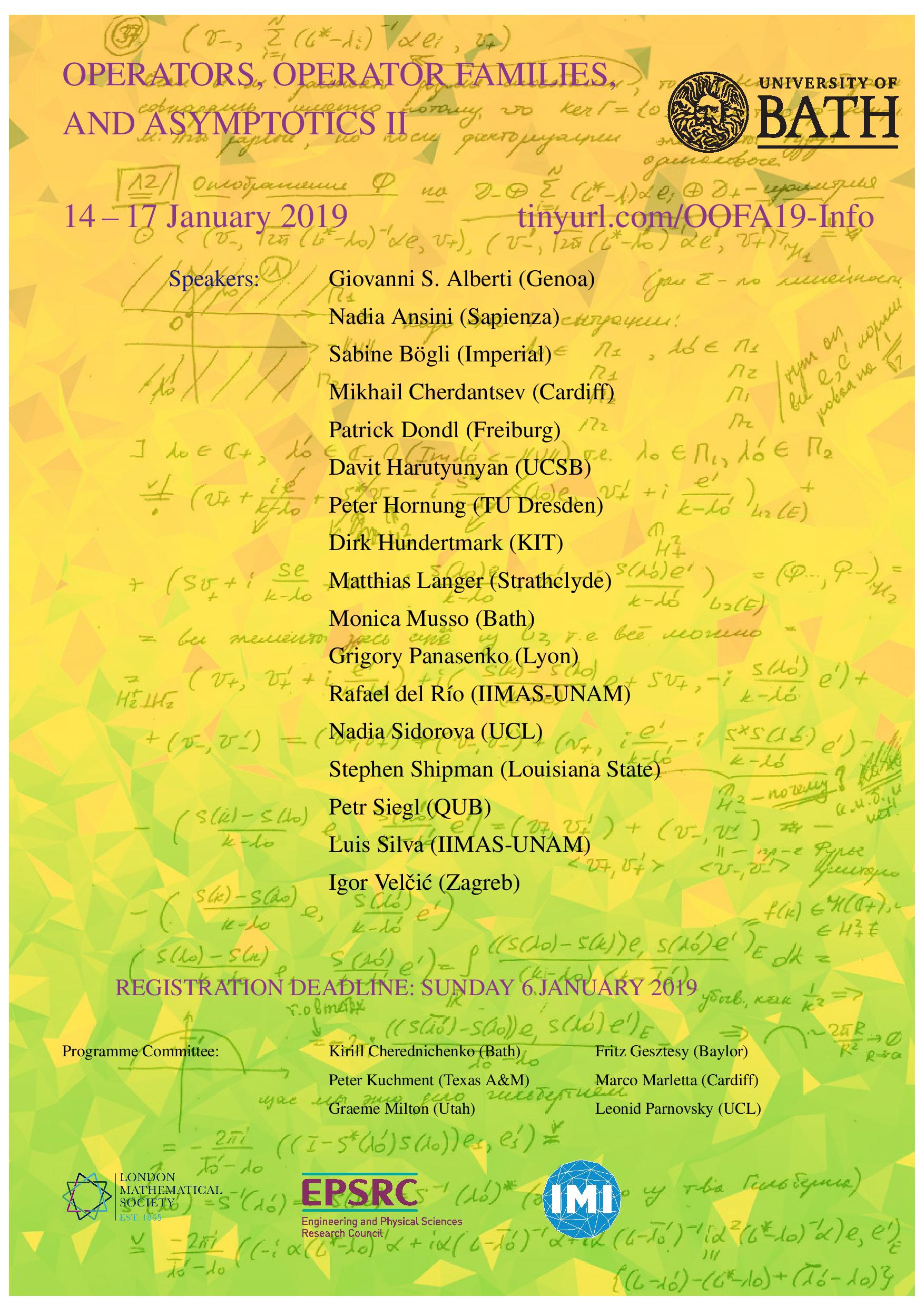 Conference poster: (larger) pdf version
Conference poster: (larger) pdf version
The conference is supported by London Mathematical Society, Newton Fund, EPSRC, and Bath Institute for Mathematical Innovation (BIMI)
Confirmed speakers:
- Giovanni S. Alberti (University of Genoa, Italy) "Essential spectrum for Maxwell's equations"
- Nadia Ansini (Sapienza University of Rome, Italy) "Scale-bridging in complex systems: a variational approach to statics and dynamics''
- Sabine Bögli (Imperial College London, UK) "Schrödinger operator with non-zero accumulation points of complex eigenvalues"
- Mikhail Cherdantsev (Cardiff University, UK) " Stochastic homogenisation of high-contrast media"
- Patrick Dondl (University of Freiburg, Germany) "The effect of forest dislocations on the evolution of a phase-field model for plastic slip"
- Davit Harutyunyan (University of California, Santa Barbara, USA) "On the asymptotics of the smallest eigenvalue of Lam\'{e} and related operators in thin domain"
- Peter Hornung (Technische Universität Dresden, Germany)"Narrow ribbons in nonlinear three-dimensional elasticity"
- Dirk Hundertmark (Karlsruhe University of Technology, Germany) "Bounds on quantum systems with Coulomb repulsion at the edge of their existence"
- Matthias Langer (University of Strathclyde, UK) "Spectral enclosures for boundary-value problems"
- Monica Musso (University of Bath, UK) "Gluing methods for vortex dynamics in Euler flows"
- Grigory Panasenko (Institut Camille Jordan, University of Lyon, France) "Reconstruction of the pressure in the method of asymptotic partial decomposition for the flows in thin domains"
- Rafael del Río (IIMAS-UNAM, México) "Inverse spectral problems for mass-spring systems"
- Nadia Sidorova (University College London, UK) "Localisation and delocalising in the parabolic Anderson model"
- Luis Silva (IIMAS-UNAM, México) "Sampling, oversampling, and subsampling in de Branges spaces arising from differential operators"
- Petr Siegl (Queen's University Belfast, UK) "Non-accretive Schrödinger operators and exponential decay of their eigenfunctions"
- Stephen Shipman (Louisiana State University, USA) "Reducibility of the Fermi surface for periodic quantum-graph operators"
- Igor Velčić (University of Zagreb, Croatia) "Operator norm long-wave asymptotics for elastic plates with rapidly oscillating periodic properties"
Programme committee:
Kirill Cherednichenko (Bath), Fritz Gesztesy (Missouri), Peter Kuchment (Texas A&M), Marco Marletta (Cardiff), Graeme Milton (Utah), Leonid Parnovsky (UCL)
Conference summary:
The conference, which is the second in a series that we hope to run every 3 years, aims at making an overview of the state of the art in a rapidly developing area of analysis concerned with application of the techniques of operator theory to the asymptotic study of parameter-dependent differential equations and boundary-value problems. From the physical point of view, the parameter normally represents a length-scale in the situation modelled by the equation: for example, a wavelength in wave propagation, or the inhomogeneity size in the theory of periodic composites. The theory of linear operators in a Hilbert space (symmetric, self-adjoint, dissipative, non-selfadjoint), which prior to the first conference in the series had enjoyed several decades of outstanding progress, had been, for much of its time, restricted to abstract analysis of general classes of operators, accompanied by ad-hoc examples and applications to perturbations of the Laplace operator. The first meeting in 2016 contributed to recent developments concerning the above link, in particular clarifying the role of operator-based techniques in the development of mathematical foundations for metamaterials. The second meeting will outline the next steps in this process, generating new research directions in the asymptotic study of operator families, where the abstract and applied streams are aligned with each other. The above subject area is currently in the state of maturing for the next breakthrough in the applications of mathematics to the real-world technologies that depend on understanding the behaviour of solutions to parameter-dependent boundary-value problems of mathematical physics. One notable example of this interaction is found in the development of techniques for manufacturing composite materials that exhibit negative refraction ("metamaterials"): analysis of operators and their families offers a cost-effective way to explore possible ways to obtain such composites, and vice versa, the practical needs give a massive stimulus to further development of this classical area of analysis.